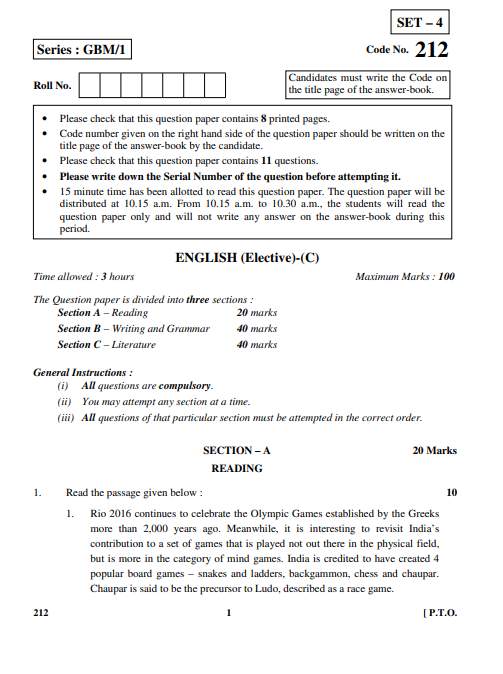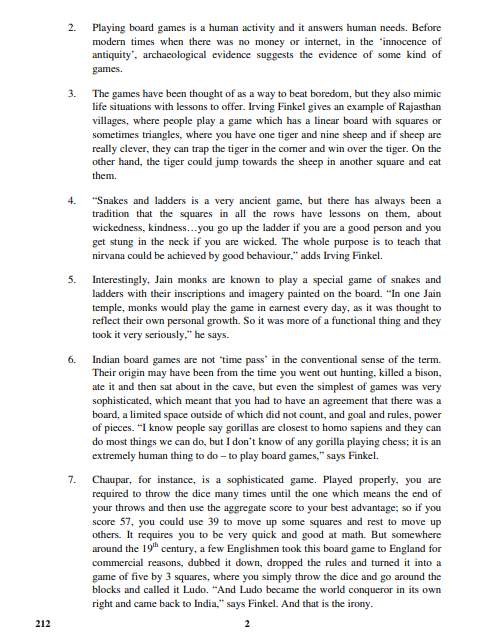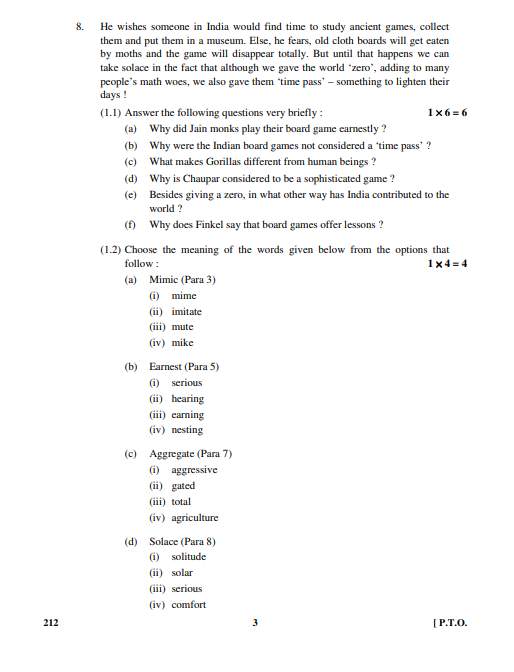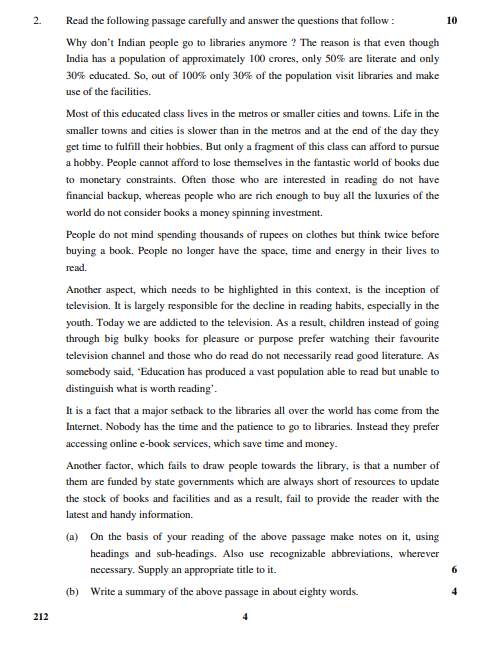The previous year CBSE (Central Board of Secondary Education) English (Elective) - (Core) subject question paper for Class 12th is as follows:
ENGLISH (Elective)-(C)
SECTION – A
READING
1. Rio 2016 continues to celebrate the Olympic Games established by the Greeks more than 2,000 years ago. Meanwhile, it is interesting to revisit India’s contribution to a set of games that is played not out there in the physical field, but is more in the category of mind games. India is credited to have created 4 popular board games – snakes and ladders, backgammon, chess and chaupar. Chaupar is said to be the precursor to Ludo, described as a race game.
2. Playing board games is a human activity and it answers human needs. Before modern times when there was no money or internet, in the ‘innocence of antiquity’, archaeological evidence suggests the evidence of some kind of games.
3. The games have been thought of as a way to beat boredom, but they also mimic life situations with lessons to offer. Irving Finkel gives an example of Rajasthan villages, where people play a game which has a linear board with squares or sometimes triangles, where you have one tiger and nine sheep and if sheep are really clever, they can trap the tiger in the corner and win over the tiger. On the other hand, the tiger could jump towards the sheep in another square and eat them.
4. “Snakes and ladders is a very ancient game, but there has always been a tradition that the squares in all the rows have lessons on them, about wickedness, kindness…you go up the ladder if you are a good person and you get stung in the neck if you are wicked. The whole purpose is to teach that nirvana could be achieved by good behaviour,” adds Irving Finkel.
5. Interestingly, Jain monks are known to play a special game of snakes and ladders with their inscriptions and imagery painted on the board. “In one Jain temple, monks would play the game in earnest every day, as it was thought to reflect their own personal growth. So it was more of a functional thing and they took it very seriously,” he says.
6. Indian board games are not ‘time pass’ in the conventional sense of the term. Their origin may have been from the time you went out hunting, killed a bison, ate it and then sat about in the cave, but even the simplest of games was very sophisticated, which meant that you had to have an agreement that there was a board, a limited space outside of which did not count, and goal and rules, power of pieces. “I know people say gorillas are closest to homo sapiens and they cando most things we can do, but I don’t know of any gorilla playing chess; it is an extremely human thing to do – to play board games,” says Finkel.
7. Chaupar, for instance, is a sophisticated game. Played properly, you are required to throw the dice many times until the one which means the end of your throws and then use the aggregate score to your best advantage; so if you score 57, you could use 39 to move up some squares and rest to move up others. It requires you to be very quick and good at math. But somewhere
around the 19th century, a few Englishmen took this board game to England for commercial reasons, dubbed it down, dropped the rules and turned it into a game of five by 3 squares, where you simply throw the dice and go around the blocks and called it Ludo. “And Ludo became the world conqueror in its own right and came back to India,” says Finkel. And that is the irony.
8. He wishes someone in India would find time to study ancient games, collect them and put them in a museum. Else, he fears, old cloth boards will get eaten by moths and the game will disappear totally. But until that happens we can take solace in the fact that although we gave the world ‘zero’, adding to many people’s math woes, we also gave them ‘time pass’ – something to lighten their
days !
(1.1) Answer the following questions very briefly : 1 × 6 = 6
(a) Why did Jain monks play their board game earnestly ?
(b) Why were the Indian board games not considered a ‘time pass’ ?
(c) What makes Gorillas different from human beings ?
(d) Why is Chaupar considered to be a sophisticated game ?
(e) Besides giving a zero, in what other way has India contributed to the world ?
(f) Why does Finkel say that board games offer lessons ?
(1.2) Choose the meaning of the words given below from the options that follow : 1 × 4 = 4
(a) Mimic (Para 3)
(i) mime
(ii) imitate
(iii) mute
(iv) mike
(b) Earnest (Para 5)
(i) serious
(ii) hearing
(iii) earning
(iv) nesting
(c) Aggregate (Para 7)
(i) aggressive
(ii) gated
(iii) total
(iv) agriculture
(d) Solace (Para 8)
(i) solitude
(ii) solar
(iii) serious
(iv) comfort
CBSE English (Elective) - (Core) question paper for Class 12th













